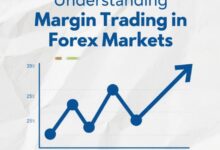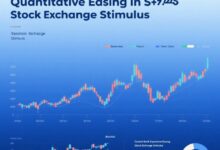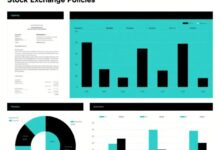The Impact of Market Speculation on Stock Exchange Price Swings
Advertisement
Market speculation has long been a subject of intense debate in the world of finance. Speculators play a crucial role in the stock exchange, as they can significantly influence price swings. This article aims to explore the impact of market speculation on stock exchange price swings, examining both the positive and negative aspects of this phenomenon. By examining relevant examples, case studies, and statistics, we can gain valuable insights into the complex relationship between speculation and stock market volatility.
Understanding Market Speculation
Market speculation refers to the act of buying or selling financial instruments with the expectation of profiting from future price movements. Speculators take positions based on their analysis of supply and demand dynamics, news events, and other market factors. They often have shorter investment horizons compared to long-term investors, striving to capitalize on short-term price fluctuations.
Speculation can take various forms, including day trading, momentum trading, and options trading. Please note that speculation differs from investing. While investors focus on long-term growth and income generation, speculators seek to profit from short-term market movements.
The Impact of Speculation on Stock Exchange Price Swings
1. Increased Market Volatility: Speculation introduces an additional layer of volatility to the stock market. Rapid buying and selling by speculators can amplify price swings, leading to increased market turbulence. This volatility can be both positive and negative, providing profit opportunities but also increasing the risk for investors.
2. Liquidity Provision: Speculators can enhance market liquidity by actively participating in trading activities. Their constant buying and selling create a liquid environment for all market participants. This liquidity is crucial for the efficient functioning of the stock exchange, enabling smooth transactions and minimizing bid-ask spreads.
3. Price Discovery: Speculators play a vital role in the price discovery process. Through their buying and selling activities, they provide valuable information to the market, helping to establish fair market prices. This price discovery mechanism ensures that market prices reflect all available information, enhancing market efficiency.
4. Herd Mentality: A notable impact of speculative behavior is the emergence of a herd mentality in the market. When a group of speculators collectively takes a position based on a particular trend or news event, it can create a self-fulfilling prophecy. This herd behavior can lead to exaggerated price swings, as seen during speculative bubbles or panics.
5. Market Manipulation: While speculation can provide liquidity and contribute to price discovery, it can also be prone to market manipulation. Unscrupulous speculators may disseminate false information or engage in illicit activities to manipulate prices for their benefit. Such manipulations can distort market fundamentals and harm genuine investors.
Case Studies and Examples
1. Dotcom Bubble: The dotcom bubble of the late 1990s is a prime example of how speculation can drive extreme price swings. Speculators fueled the rapid rise in technology stocks, betting on the potential of the internet. However, when the bubble burst in 2000, stock prices plummeted, causing significant losses for many investors.
2. GameStop Short Squeeze: In early 2021, individual retail investors organized through online forums and social media platforms initiated a short squeeze on GameStop stock. This speculative frenzy drove the stock price to astronomical levels, causing substantial losses for hedge funds that had shorted the stock. The event highlighted the power of collective speculation and its impact on market dynamics.
The Role of Regulation
Regulation plays a crucial role in mitigating the negative impacts of market speculation while preserving its positive contributions to the stock exchange. By enforcing transparency, preventing market manipulation, and promoting fair trading practices, regulators can foster a balanced and efficient marketplace.
Examples of regulatory measures include:
- Disclosure requirements: Requiring companies and individuals to disclose their positions and intentions can help prevent insider trading and enhance market transparency.
- Short-selling regulations: Imposing restrictions on short-selling activities can prevent excessive speculation and market manipulation.
- Margin requirements: Setting appropriate margin requirements can reduce excessive leverage, minimizing the risk of market disruptions caused by speculative trades.
Conclusion
Market speculation has a profound impact on stock exchange price swings. While it can enhance market liquidity, contribute to price discovery, and provide profit opportunities, it also introduces volatility and the potential for market manipulation. Understanding the nuances of speculation is crucial for both investors and regulators in navigating the dynamic world of finance.
FAQs After The Conclusion:
1. Can market speculation be beneficial for the stock market?
Yes, market speculation can provide liquidity, contribute to price discovery, and generate profit opportunities. However, it also introduces volatility and the risk of market manipulation.
2. How does speculation differ from investing?
Speculation focuses on short-term price movements and capitalizing on market fluctuations, while investing is more oriented towards long-term growth and income generation.
3. What are some notable speculative bubbles in history?
Examples of speculative bubbles include the dot-com bubble, the housing bubble that led up to the 2008 financial crisis, and the more recent cryptocurrency boom and subsequent crash.
4. What role does regulation play in controlling speculation?
Regulation aims to mitigate the negative impacts of speculation while preserving its positive contributions. Measures such as disclosure requirements, short-selling regulations, and margin requirements help ensure fair and transparent market practices.
5. How can investors protect themselves from excessive speculation?
Investors can protect themselves by diversifying their portfolios, conducting thorough research, and avoiding impulsive decisions based solely on speculative trends. Seeking advice from financial professionals can also provide valuable guidance.
Summary
Market speculation significantly impacts stock exchange price swings, adding volatility and liquidity and contributing to price discovery. While speculation can benefit the market, it is also susceptible to herd behavior and market manipulation. Regulatory measures play a crucial role in maintaining a balanced and efficient marketplace. Understanding the dynamics of speculation is vital for investors and regulators to navigate the complexities of the stock market.






